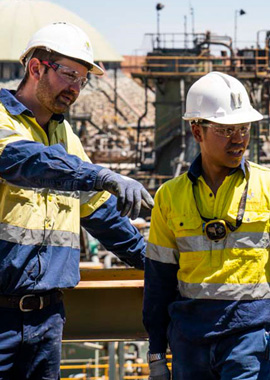Metallurgy
Metallurgy
Metallurgists use their knowledge to recover minerals and valuable metals from natural ores, and to alloy and cast materials to produce commercial metal products.
Key tasks
- Apply physical and chemical methods to separate and concentrate valuable minerals and metals from ores
- Produce crude, refined or alloyed metal for market
- Apply chemical, metallurgical and process engineering fundamentals to solve problems or improve existing processes
- Manage process automation, process control and metallurgical plant performance
- Develop process flowsheets and metallurgical plant design
- Improve environmental performance of metallurgical operations and meet all environmental standards
Skills and attributes
- Data collection and analysis
- Problem solving and critical thinking
- Working as part of a multidisciplinary team
- Understanding chemical processes
- Project planning and management
A typical day
- The diverse nature of metallurgy means variety is the norm. On-site metallurgists may be involved in project planning, contractor meetings, equipment monitoring and much more.
Role types
- Production Metallurgist: Extract metal or minerals from ores to produce saleable metals or concentrates.
- Hydrometallurgist: Treat ores through low temperature refining and techniques such as leaching, solvent extraction and electrolytic processes.
- Pyrometallurgist: Develop high temperature heat-based processes to concentrate, extract, refine and process metals and other materials.
- Electrochemical Metallurgist: Develop processes that take place in some form of electrolytic cell, including electrowinning, electro-refining and fused salt electrolysis.
- Geometallurgist: Combine geology or geostatistics with extractive metallurgy to create spatially or geologically-based predictive models for mineral processing plants.
- Foundry Metallurgist: Melt, alloy, pour and cast metals with specific material form and characteristics such as material strength, permeability, hardness and chemical composition.
- Consulting Metallurgist: Work on a variety of processes, plants and ores; specialise in certain processes or metals/minerals and provide certain specific technical information to operations.
- Process Engineer: design and construct processing plants; complete or coordinate metallurgical testing of ores to identify the best method for processing and establish equipment criteria for plants.
- Research Metallurgist: Work in universities or research centres and investigate why and how metallurgical processes behave the way they do or are the way they are.
- Materials Engineer: Investigate the properties of metals and other materials and develop and assess their commercial and engineering applications.
Nature of work
- Work can be residential, fly-in, fly-out (FIFO) or drive-in, drive-out (DIDO)
- Rosters and hours will vary accordingly
Travel
- Expect some travel, particularly to sites in remote areas
- Metallurgists with good experience can find work opportunities overseas
